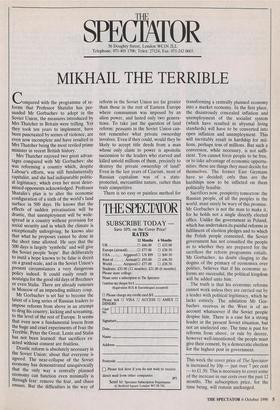THE
SPECTATOR
56 Doughty Street, London WC1N 2LL Telephone: 071-405 1706; Telex: 27124; Fax: 071-242 0603
MIKHAIL THE TERRIBLE
Compared with the programme of re- forms that Professor Shatalin has per- suaded Mr Gorbachev to adopt in the Soviet Union, the measures introduced by Mrs Thatcher in Britain were trifling. Yet they took ten years to implement, have been punctuated by scenes of violence, are even now incomplete and have resulted in Mrs Thatcher being the most reviled prime minister in recent British history.
Mrs Thatcher enjoyed two great advan- tages compared with Mr Gorbachev: she was reforming a country which, despite Labour's efforts, was still fundamentally capitalist, and she had indisputable politic- al legitimacy, which even her most deter- mined opponents acknowledged. Professor Shatalin's plan is to alter the economic configuration of a sixth of the world's land surface in 500 days. He knows that the effects of sudden privatisation will be drastic, that unemployment will be wide- spread in a country without provision for social security and in which the climate is exceptionally unforgiving; he knows also that what he proposes cannot be done in the short time allotted. He says that the 500 days is largely 'symbolic' and will give the Soviet people 'hope'. But deliberately to instil a hope known to be false is deceit on a grand scale, and in the Soviet Union's present circumstances a very dangerous policy indeed. It could easily result in nostalgia for the good old days of Brezhnev Or even Stalin. There are already rumours in Moscow of an impending military coup.
Mr Gorbachev is set fair to become the latest of a long series of Russian leaders to impose reforms from above in an attempt to drag his country, kicking and screaming, to the level of the rest of Europe. It seems that even now a fundamental lesson from the huge and cruel experiments of Ivan the Terrible, Peter the Great, Lenin and Stalin has not been learned: that sacrifices ex- acted without consent are fruitless.
Drastic reform is absolutely necessary in the Soviet Union; about that everyone is agreed. The near-collapse of the Soviet economy has demonstrated unequivocally that the only way a centrally planned economy can function even minimally is through fear: remove the fear, and chaos ensues. But the difficulties in the way of reform in the Soviet Union are far greater than those in the rest of Eastern Europe where communism was imposed by an alien power, and lasted only two genera- tions. To take just the question of land reform: peasants in the Soviet Union can- not remember what private ownership involves. Even if they could, would they be likely to accept title deeds from a man whose only claim to power is apostolic succession to the leaders who starved and killed untold millions of them, precisely to destroy the private ownership of land? Even in the last years of Czarism, most of Russian capitalism was of a state- protected, mercantilist nature, rather than truly competitive.
There is no easy or painless method for transforming a centrally planned economy into a market economy. In the first place, the disastrously concealed inflation and unemployment of the socialist system (which have resulted in abysmal living standards) will have to be converted into open inflation and unemployment. This will inevitably result in hardship for mil- lions, perhaps tens of millions. But such a conversion, while necessary, is not suffi- cient. You cannot force people to be free, or to take advantage of economic opportu- nities: these are things they must decide for themselves. The former East Germans have so decided; only thus are the hardships now to be inflicted on them politically feasible.
Sacrifices now, prosperity tomorrow: the Russian people, of all the peoples in the world, must surely be wary of this promise. Mr Gorbachev is not the man to make it, for he holds not a single directly elected office. Unlike the government in Poland, which has undertaken its painful reforms in fulfilment of election pledges and to which the Polish people consented, the Soviet government has not consulted the people as to whether they are prepared for the sacrifices the reform programme entails. Mr Gorbachev, no doubt clinging to the dogma of the primacy of economics over • politics, believes that if his economic re- forms are successful, the political kingdom will be added unto him.
The truth is that his economic reforms cannot work unless they are carried out by a leader with political legitimacy, which he lacks entirely. The adulation Mr Gor- bachev receives in the West is of no account whatsoever if the Soviet people despise him. There is a case for a strong leader in the present Soviet situation, but not an unelected one. The time is past for reforms from above, or rule by decree, however well-intentioned: the people must give their consent, by a democratic election for the highest post in government.


















































 Previous page
Previous page